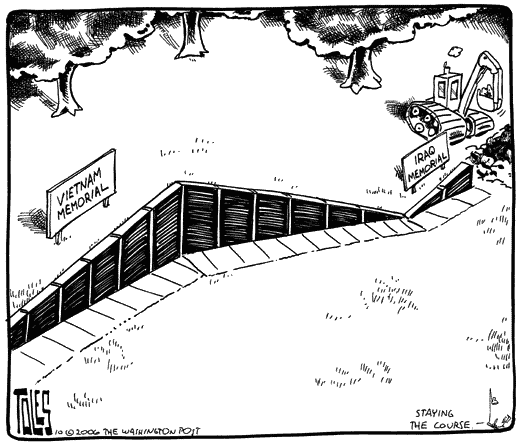Vietraq
In a previous entry, I noted that the President had finally conceded some Vietnam/Iraq similarities, agreeing to a comparison between the violence in Iraq today and the 1968 Tet Offensive (oft-credited for being a major turning point here against support for the war). On KCRW's 'Left, Right, and Center' yesterday, conservative Tony Blankley explained that what the President was getting at was that the Iraqi insurgents today are aiming to recapture the effects of the '68 offensive and damage the will of the American people prior to an election. As Arianna Huffington rebutted, the notion that the rising sectarian battles inside Iraq are based on who they'd prefer to be Speaker of the House is absurd. Blankley insisted that we must stay the course and not lose our will (or our Republican congress). Admittingly, I wasn't alive during Vietnam, but Blankley's logic was intellectually insulting.
The notion that Americans began to turn against Vietnam because they had somehow been psychologically manipulated by the actions of the VietCong is bullshit, and is simply meant to reinforce the current Bush spin that Americans have only turned against his war because of similar manipulation by insurgent violence and our 'liberal' media. The fact of the matter is that people slowly began turning against Vietnam because they came to the conclusion that the war was a mistake, that it was not worth the cost, and that we could not win. It is the same today with Iraq.
Conservative revision on Vietnam has solidified in the past few years. To hear conservatives tell it, the lesson of Vietnam is that we allowed ourselves to lose our will and to prematurely exit the war, leaving South Vietnam to ruin. I wonder where these conservatives were in 1968 (if they had been born yet). Probably not in the jungles of Vietnam, I bet.
Most intelligent people, however, seemed long ago to understand that the lesson of Vietnam was: that we never should've gotten involved in that war to begin with; that our problem was not that we exited prematurely in '75, but that we stayed too long and didn't cut our losses in '65; and that it is not only not right, but not possible, for the United States to engage in military aggressions in foreign lands to serve domestic political theories (the domino theory fears for Southeast Asia, reinvented as Bush's democracy-reverse-domino theory for the Mideast). That some conservatives do not understand this, and seem unaware of this reality, however noble their intentions may indeed be, is a frightening thought.
Despite a much higher body count, the Vietnam era did have a few things over this one... a Congress that was willing to challenge its own party's Presidential leadership in substantive ways and a news media that didn't attempt to sugarcoat the realities of the war. The absence of the latter today is a big reason why pundits and politicians remain able to discuss/dismiss the war in abstract terms.
Of course, the symbolic similarities between Vietnam and Iraq are endless (including that both were started by using lies- attacks in the Tonkin Gulf, WMDs and 9/11 ties- to escalate a war based on existing policy) and I won't go through the litany. But one major thing that they do have in common is that history will look back on both as mistakes that consumed an era that was supposed to be ruled by hope and progress, the fault of stubborn politicians willing to commit political suicide rather than admit a mistake. I hope that maybe this time we will remember to learn the lesson.



1 Comments:
If it's possible to be pleased by such a thing {sic} this is a point I was going to make in my Vietnam Minus Jungle Add Sand And Repeat post.
The cartoon is interesting. It would be a crime to connect the Iraq and Vietnam memorials. Especially since we were suppose to have learned from Vietnam.
I think that the Iraq memorial may work best at one of the Bush Presidential Libraries. Somehow I think it should be based on a hole in the ground since they seemed to be digging a pathway to Hell for us.
Post a Comment
<< Home